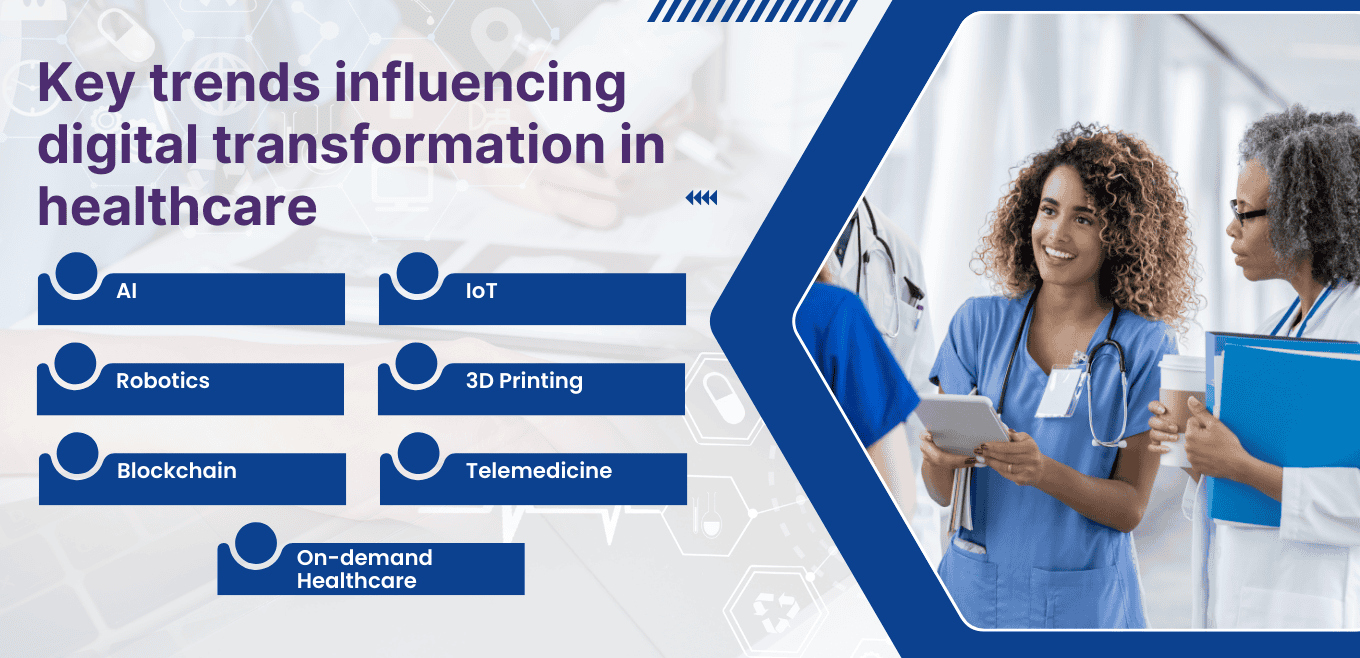Whether it is banking, shopping, or travel, technology is revolutionizing every aspect of life and will always play a part. There is still an opportunity for technology to make major strides in the healthcare sector. According to Deloitte research, approximately 92% of healthcare professionals and institutions reported improved performance due to digital transformation. Those numbers are interesting to look at, aren’t they? It is now clear that services for digital transformation play a big part. They allow healthcare providers to utilize technology in novel ways.
Additionally, according to data provided by PR Newswire, the global digital healthcare market is anticipated to reach $504.4 billion by 2025. Once more, to revolutionize your healthcare sector, you would require a comprehensive understanding of the modern digital health platform.
We will guide you through each step of the healthcare industry’s digital transformation in this blog. Let’s get started right away.
What is digitalization in healthcare?
Digitalization is changing healthcare and improving services at the same time. As technology advances, more and more patients are using the internet to research their health, especially in the case of cancer and chronic conditions, and they bring a wealth of new questions and insights to their doctors. In a sense, it’s raising awareness of how people are using the internet to further their education.
Organizations can maximize patients’ motivation for this self-guided study by providing them with digital health solutions, such as mHealth apps. Patients can improve their self-management and get their questions answered with the aid of the apps. It will also allow them to offer a more important ally to healthcare professionals.
In the best-case scenario, a comprehensive cultural shift from traditional to collaborative care can be readily facilitated by digitalization in the healthcare industry. It will normalize the collaborative decision-making process.
Moreover, implementing healthcare software development will give you accurate and superior clinical services in addition to keeping you ahead of the digital curve.
Benefits of digital transformation in healthcare
Adopting digital healthcare transformation is a smart move for reasons other than government grants and other incentives. Both patients and providers benefit from using digital healthcare services.
Physicians, hospitals, medical facilities, and all other healthcare providers gain from digital healthcare solutions in the following ways:
By removing paperwork, improving data accessibility, and cutting down on the amount of time required for patient examinations, it streamlines workflows.
- It makes it possible for patients and doctors to communicate remotely more successfully.
- It makes it possible for medical staff to communicate and share data effectively.
- It establishes a safe database for electronic health information.
- Digital healthcare is advantageous to patients for the following reasons:
- They can obtain individualized medical care.
- They have easier access to their health records and can monitor critical health metrics in real-time.
- Appointment scheduling is made convenient by digital healthcare solutions.
Benefits of digital transformation for patients
The days when patients could only schedule in-person sessions are long gone. The shift to digital technology may benefit patients in several ways. To help you understand the benefits, let’s review the list.
1. It offers tailored healthcare services
More accurate medical diagnosis and more effective treatment are made possible by the use of digital healthcare. Having said that, you should be aware that the healthcare industry may have a bright future thanks to custom software development, which places a strong emphasis on delivering top-notch patient care.
2. It makes individual health records easy to access
With the help of a healthcare web app, patients may monitor and control their personal health indicators and obtain a comprehensive analysis online.
3. It makes scheduling appointments simple
Patients can now choose the most convenient time and date for their appointment because of the digital transformation in healthcare.
4. It provides great doctor-to-doctor communication on the internet
Professional help is available to patients via video calls or online chat, and they can receive comprehensive prescriptions and treatment programs via email or their portal website.
These are some benefits that patients and healthcare providers can receive from digital healthcare technologies.
Uplift Your Healthcare Process with Leading Custom Healthcare Software Development
Key trends influencing digital transformation in healthcare

Change never happens in a vacuum, and the digital transformation of healthcare has been impacted by several variables. We must look at the reasons behind the growing popularity of digital healthcare solutions to understand why there is this industry-wide movement toward them. The following are the main forces behind the healthcare industry’s digital transformation:
Emerging technologies
For technology advancements, the past year has been amazing. It has never appeared more possible to live in a world where everything is connected with ease via the internet. Big data, the Internet of Things, and artificial intelligence (AI) are examples of digital transformation services in healthcare that have a lot of potential to improve things. Here are a few instances of how technology will hasten the healthcare industry’s digital transformation.
1. AI
The automation of record-keeping duties while removing human error is the most evident application of AI in digital healthcare services. However, AI can also be applied to the development of individualized treatment regimens for patients and predictive diagnostics. The extensive usage of AI healthcare chatbots is another way AI will revolutionize digital healthcare.
2. IoT
There are numerous potential uses for IoT devices in the medical field. First, the foundation for future real-time, precise patient profiles will be provided by health wearables that gather crucial biometric data. Additionally, IoT-connected gadgets will soon be ubiquitous in hospital settings, greatly increasing operational efficiency through a constant flow of real-time data and insights.
3. Robotics
Surgery will be transformed by the creation of medical robots that are capable of precise yet complex tasks. With the use of specialized robots, surgeons will be able to carry out complex procedures—even remotely.
4. 3D printing
The potential for developing personalized implants and prostheses is nearly endless thanks to 3D printing. This innovative design technology has discovered a new use in the transformation of digital healthcare.
These technologies are just a handful of examples. Others include blockchain (verified electronic health records), cloud computing (remote healthcare services), and big data (assists in developing patient profiles and offering treatment alternatives). New and exciting opportunities for the transformation of digital healthcare keep coming up as long as innovation persists.
5. Blockchain
Blockchain’s decentralized ledger makes it easier for administrators, insurers, healthcare service providers, and patients to communicate with one another. Blockchain facilitates privacy-preserving health credential verification.
It is locating new vendors for essential products. It streamlines and expedites supplier management and onboarding while removing risks.
6. Telemedicine
Patients’ interactions with healthcare providers are evolving as a result of this development. Video conferencing, telemedicine, remote patient monitoring, and mobile health apps (mHealth) are some of the significant technologies that fall under the umbrella of telehealth. By monitoring their data and behaviors, telehealth can be combined with wearable technology and the Internet of Things to manage high-risk patients. To be specific, telehealth is a cutting-edge approach that covers a wide range of digital health topics.
Looking to Transform Telehealth Solutions with Seamless Healthcare Integrated Solutions?
Discover how People10 revolutionized a cloud-based telehealth platform through the integration of EHR/EMR systems for seamless data exchange.
7. On-demand healthcare
Patients can avoid the inconvenience of routine clinic visits and medical organizations for follow-ups by using an on-demand healthcare app. Furthermore, this movement is not solely focused on users.
Patients can use it to schedule appointments from the comfort of their own homes, pay using the app, and receive immediate summaries of their medical reports for use in future consultations.
Digital Transformation in healthcare: challenges and difficulties
When it comes to implementing digital technology and services, the healthcare sector continues to lag behind many others, despite the obvious advantages of digital transformation.
Let’s look at the main obstacles to healthcare’s digital revolution.
1. Data security and privacy issues
One of the most sensitive types of data that is available is patient healthcare data. As a result, worries about cybersecurity and data privacy about digital healthcare are to be expected.
The majority of administrative enterprise resource planning (ERP) software that is now on the market does not adhere to the stringent security requirements, even though many of them can be used in healthcare settings. Selecting appropriate digital healthcare solutions that adhere to legal requirements and safeguard patient information is crucial.
2. The resistance to change in healthcare organizations
Physicians are among the oldest occupations in human history, and many healthcare institutions have a long history dating back several decades. These organizations are inherently resistant to change, particularly the kind of organizational transformation that digital transformation in healthcare is expected to bring about.
3. Problems with interoperability
Interoperability problems are another difficulty that digital healthcare solutions must deal with as a result of healthcare companies’ reluctance to adapt. Newer digital apps and legacy systems don’t always work together.
Additionally, there are a lot of platforms in the current digital healthcare ecosystem, and sharing information isn’t always a simple procedure.
4. Lack of staff
Historically, there was little overlap between the specializations of IT and healthcare. The shift to digital healthcare has fundamentally altered that paradigm. Except for a few anomalies, doctors and other healthcare professionals need to update their abilities to incorporate expertise with digital healthcare technologies, and this transformation is only happening gradually.
How can the digital healthcare transformation overcome challenges?
Accelerating the shift to digital healthcare is not solely hampered by the issues listed above. Platform data silos, antiquated payer models, and the problem of managing a dispersed staff are further obstacles. It will need dedication and hard work to overcome these obstacles.
A chief technology officer is one of the best ways to guarantee that digital transformation becomes ingrained in a healthcare firm. In addition to advocating for the use of new technology, this person can search for digital healthcare solutions that complement the organization’s goals and objectives.
Promoting digital transformation in the healthcare sector also requires providing the necessary training for employees, setting up the infrastructure needed for patients to access digital healthcare solutions, and keeping up with new developments in health technology.
Conclusion
As you are probably aware, digitization incorporates digital technologies into healthcare, such as digital health technology systems, to improve patient satisfaction and increase the effectiveness of healthcare practitioners. Furthermore, it is not limited to the advantages that come with it; it also calls for a culture shift that includes adopting new business models and ways of thinking that you hope to provide to consumers.
The blog’s goal was to explain digital transformation and its advantages for the healthcare industry. You will need to completely change your procedures in order to get the most out of it.
At People10, a leading provider of healthcare app development, we have created numerous scalable solutions for the healthcare sector based on clients’ requirements. We will drive the best healthcare digital strategy for your company with a talented team of committed developers and state-of-the-art technologies.
Digitize Your Healthcare Solutions by Harnessing the Power of Cutting-edge Technologies for Better Patient Care



